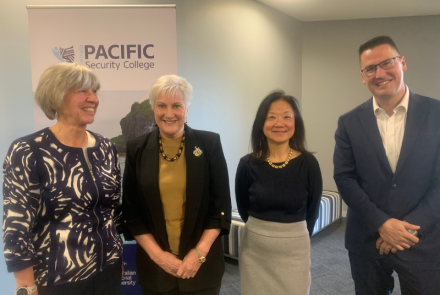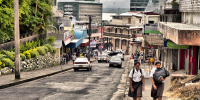
Professor Meg Keen, Dame Annette King, Professor Fiona Yap and the Hon Zed Seselja. Photo: Ben Bohane
Pacific Island nations marching to self-reliance, say Australia and New Zealand leaders
The pressing issues of climate change, the COVID-19 pandemic and the influence of China need immediate attention from Australia and New Zealand if the two countries are to help Pacific Island nations achieve self-reliance in years to come.
That was the key issue to come from a webinar hosted by the Australian Pacific Security College (PSC) at The Australian National University (ANU) on Thursday 29 July.
Australia’s Minister for International Development and the Pacific Zed Seselja and New Zealand High Commissioner to Australia Dame Annette King led the discussion with host, PSC Director Professor Meg Keen, while a number of key stakeholders in the Pacific posed questions facing their countries.
“Where do you see Australia and New Zealand in tackling the multi-faceted climate change threat in the Marshall Islands and the North Pacific,” asked Chair of the Marshall Islands National Nuclear Commission Rhea Moss-Christian.
Ms King acknowledged climate change as the biggest threat to Pacific Island nations, while Mr Seselja said Australia was deeply committed to meeting and beating its carbon emissions targets by 2030.
The COVID-19 pandemic was a clear talking point, with more than 4,000 Fijians turned away from hospitals due to lack of beds in the past fortnight.
“The COVID-19 pandemic has been dominating Fiji and Timor-Leste, while many other parts of the Pacific are COVID-free, but they are still feeling the economic impact from closed borders,” Mr Seselja said.
“We should acknowledge that our attention on health issues started well before COVID hit,” Ms King said. “It’s about what we do in the long-term while not losing sight that there’s a rotavirus outbreak in Samoa and tuberculosis hasn’t gone away in PNG.”
The webinar also covered stimulus programs to assist Papua New Guinea, trans-national crime issues in the Solomon Islands and Bougainville, and the protection of economic fishing zones.
Mr Seselja, who recently visited Papua New Guinea, said a highway linking Port Moresby and Lae was a sorely-needed piece of infrastructure that would help connect the country. A new hospital has also recently been opened there.
Ms King said the collective voice of Pacific Island nations was louder than ever in ensuring they are heard in Indo-Pacific dialogue with China.
“We might be small, but when you put us together, we are big and we have a collective voice,” she said.
“The vote of Australia or New Zealand is the same as Tonga and these voices will be heard at the APEC meetings in November this year.”
Rounding off the discussion, Ms King and Mr Seselja were asked what their one suggestion would be for a more sustainable and prosperous Pacific.
“Recast current challenges into opportunities for 2050. Without health, you have nothing. Self-sufficiency and the ability for Pacific Islands to control their own health systems and secure supply,” Ms King said.
“Infrastructure which helps produce prosperity and release the great potential that exists in the region,” Mr Seselja said.
However, both added there were more than one suggestion as they looked towards a future where Pacific Island nations could be self-reliant and their next generation can reinvest their knowledge to their own communities.
You can watch the one-hour discussion on the Pacific Security College website, and follow PSC on Facebook and Twitter.
This article is republished from the ANU College of Asia and the Pacific. Read the original article.
Updated: 1 September 2024/Responsible Officer: Crawford Engagement/Page Contact: CAP Web Team













